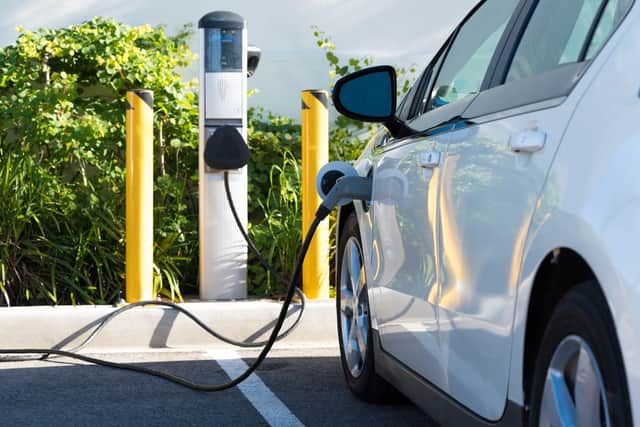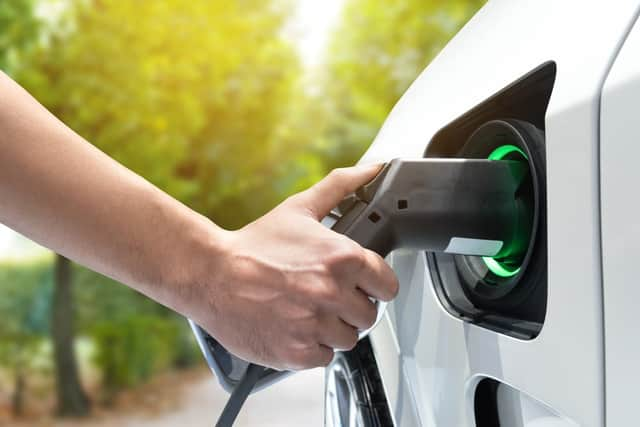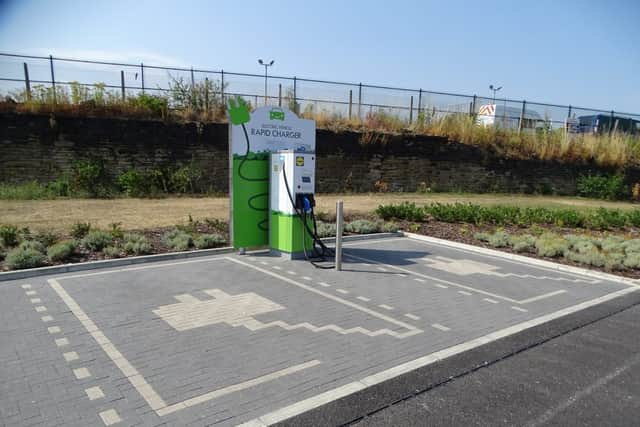Electric car charging questions answered, from how long it takes to how much it costs


2020 looks set to be a massive year for electric cars. Several major manufacturers have either already launched new EVs or have models due to go on sale later this year.
On top of that there are rumours of a Government-backed scrappage scheme that could offer incentives to switch to an electric car. There are also suggestions that the drop in traffic-related pollution during lockdown could encourage more drivers to switch to zero-emissions motoring.
Advertisement
Hide AdAdvertisement
Hide AdSome of the biggest questions around EVs, besides how far they can travel, are around charging - how much it costs, how long it takes, and where you can charge your EV.
The answers to all these questions depend on a variety of things, including the size of a car’s battery, the type of charger it has, where you’re charging and even the brand of car.
How much does it cost to charge an EV?
How much it costs to charge an electric car is dependent on a number of factors.
The first is the car itself. Different cars have different battery capacities and in some cases, such as the Nissan Leaf and various Teslas, the same car can come with a choice of battery capacity. The larger the battery, the more electricity it will hold and the more it will cost to charge it but the further you’ll go on a single charge.
Advertisement
Hide AdAdvertisement
Hide AdThe second factor is where you plan to charge. In general, charging at home using a domestic wallbox is cheaper than using a public charger. The type of charger will also have an effect. If you’re using a public charging network then the faster the charger, the more you should expect to pay.
To calculate how much a car will cost to charge you multiply its capacity by the energy cost.
This is simple for home charging, as long as you know your energy tariff. For example, the best-selling Renault Zoe has a 52kWh battery. At the UK average of 14.4p per kWh it will cost you £7.48 for a full charge. A 64kWh vehicle such as the Nissan Leaf E+, Hyundai Kona or Kia e-Niro will cost £9.21 and a 100kWh Tesla Model S will cost £14.40.
Some energy suppliers are now offering tailored EV packages with incentives such as lower off-peak rates for overnight charging, discounts on public charger access and free domestic chargers.
Advertisement
Hide AdAdvertisement
Hide AdCosts at public chargers are more complicated. Some charge per kWh, others charge by time and some include an initial connection fee. Slow 3kW chargers are the cheapest to use, with the highest costs found on the 50kW and above chargers. An investigation by What Car? found prices ranging from 9p per kWh to 40p per kWh, with connection fees from zero to £3.50. On top of that, some services charge a monthly subscription. In Scotland, ChargePlace Scotland offers unlimited free public charging for a flat £20 annual payment.
Complicating things further, some Tesla owners have unlimited free access to the brand’s exclusive 120kW Superchargers while others have to pay to use them, it all depends on the model and when it was purchased.


How long does it take to charge an EV?
This also depends on the car and the charger.
Most of the latest EVs are equipped with the capability to use the growing public network of 50kW “rapid” chargers, while an increasing number of models, such as those from Tesla, Audi and Volkswagen, can utilise 100kW chargers and beyond.
As you’d expect, larger batteries take longer to charge but on a 50kW rapid charger most current models will charge to 80 per cent in between 60 and 90 minutes.
Advertisement
Hide AdAdvertisement
Hide AdA 40kW Nissan Leaf will go from 20 to 80 per cent charge in around 60 minutes while the 62kW version will take 90. Hyundai says its 64kWh Kona Electric will take 75 minutes to go from zero to 80 per cent charge on a rapid charger and Renault claims the 52kWh Zoe will add the same charge in 100 minutes.
Below rapid chargers, “fast” chargers operate at between 7kW and 22kW. On public networks these are useful for a quick top-up rather than a full charge. Home wallboxes also generally offer 7kW charging, where an overnight charge will completely recharge most cars’ batteries. Some vehicles, such as the Jaguar I-Pace can use 11kW home charging but this requires a three-phase domestic power supply.
A full charge will take somewhere between 7 and 12 hours on a 7kW charger, depending on battery size. For example, a 40kWh Leaf takes around seven and a half hours while the 62kWh model takes 11 and a half. The Zoe will take around eight hours, while the Kona will take nine and a half.
At the very bottom of the charger heap are 3kW slow chargers which, predictably, take about twice as long as a 7kW unit.
Where can I charge my EV?
Advertisement
Hide AdAdvertisement
Hide AdMost EV buyers opt to have a domestic charger fitted at home and do most of their charging via this. The Government currently offers a £350 grant towards the cost of having a home charger installed.


However, when you’re out and about there are more than 30 networks offering public charging. According to Zap-Map there are currently 11,600 charger locations with a total of 32,250 connectors, ranging from 3kW to 350kW.
Common locations to find public chargers are at motorway service stations, retail parks and supermarkets, public car parks and park-and-ride facilities as well as leisure centres, hotels, visitor attractions and car dealerships. More and more retailers are also adding chargers at their locations, with McDonald’s among the latest to announce plans install rapid chargers at its restaurants.
Different locations will feature different networks’ chargers, meaning you may have to sign up to additional networks before being able to use the chargers, although some are now working together to create a single-subscription service. In most cases, you can download an app to your phone to allow payment and access, although some units require a specific RFID membership card. Some charging providers also accept credit or debit card payment without a membership.
This article first appeared on The Scotsman